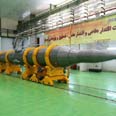

WASHINGTON – The financial sanctions and oil embargo imposed on Iran by the West have affected the Islamic Republic's ballistic missile development program, a new report by the International Institute for Strategic Studies said Monday.
According to the London-based IISS, the financial sanctions "have stymied efforts to develop and produce the long-range ballistic missiles capable of striking potential targets in western Europe and beyond."
Related stories:
- Iran urges baby boom
Analysis: Iran accelerating nuclear timetable
Iran and Syria make energy deals amid crisis
The sanctions, and especially trade embargos placed in the exports of information technology components and knowledge, have prevented the Islamic Republic from accessing key propellant ingredients and components needed for the continued development of its missile program.
Iranian long-range missile test
IISS believes that the problems Iran is facing have stemmed the development of its long-range Ghadr missiles – Ghadr-1 has a maximum range of roughly 1,600km when and carries some 750kg of explosives; as well as its Sajjil missiles – Sajjil-2 has a maximum range of about 2,000km and can carry a 1,300–1,500kg warhead.
According to the IISS, Sajjil-2 offers Iran three significant strategic benefits: It is based in solid fuel, requires smaller logistical infrastructure and because of its relatively compact design it can be easily fitted on road-mobile launchers.
Sajjil-2's range is superior to that of the Ghadr-1 and it can reach Israel; and moreover, Sajjil technology could provide the foundation for the development of longer-range missiles.
But Iran has only tested the Sajjil-2 about 20 times – not enough to make the missile operational – and IISS said that Tehran would need to conduct "at least another half-dozen flight tests" before the missile could be deployed.
"Iran's missile-related activities suggest that the reason for the hiatus is not that it is seeking to avoid provoking international opprobrium for violating UN sanctions," the institute said, adding it is more likely that a major design flaw was discovered.
Meanwhile, US Secretary of Defense Leon Panetta is expected to arrive in Israel on Tuesday, as part of a Mideast tour.
Speaking to reporters on his plane, Panetta said that "With regards to where Israel is right now, my view is that they have not made any decisions with regards to Iran and that they continue to support the international effort to bring pressure against Iran" to stop its nuclear program.
Panetta will meet with Prime Minister Benjamin Netanyahu and Defense Minister Ehud Barak.
Panetta's visit follows that of US Secretary of State Hillary Clinton, US National Security Advisor Tom Donilon and Republican presidential hopeful Mitt Romney.
- Receive Ynetnews updates
directly to your desktop















